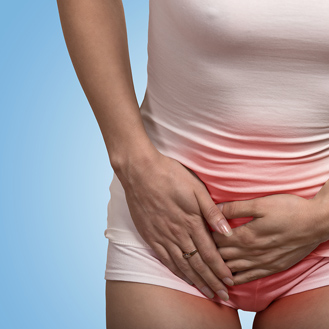
February 10, 2022
By Lily Van Tongeren, MS4, Drexel University College of Medicine
Did you know that one in five college-aged women experience pain with sexual intercourse? In fact, nearly three out of four women have pain during intercourse at some point during their lives.1,2 Does this mean that its normal and should be tolerated? No.
- Vulvodynia is defined as chronic genital pain of at least three months' duration that has no known etiology.
- Dyspareunia is defined as genital pain associated with sexual intercourse. It can occur just before, during or after sex.
- Vaginismus is defined as recurrent or persistent involuntary muscle spasm of the outer one-third of the vagina.3
Before going on to discuss the possible causes of pain during sex, when to seek out medical attention, and what kind of interventions are available, I’d like to address pain during the first penetrative sexual encounter.
Having penetrative penis-in-vagina sex for the first time can be painful. Variations in pelvic anatomy and quantity of hymenal tissue can affect how much tearing occurs during penetration. But also, mental preparedness and sexual arousal can influence one’s experience of pleasure and/or pain.
There is no easy formula for what someone with a vagina can do to make their first time pleasurable. Things that might help include:
- Becoming familiar with one’s own anatomy (through masturbation) and explore what areas are most pleasurable.
- Using lots of lube (without adequate lubrication, friction can cause microtears to the vulva and vagina which can cause pain and burning).
- Being relaxed, comfortable, and feeling safe. Just like the involuntarily clenching of our jaws with stress, the muscular walls of the vagina can tighten if someone is anxious or scared.
Now let’s fast forward to when you have had more than one sexual encounter and you continue to or start to experience pain with sex.
Common causes of dyspareunia in college-aged students include:
- Vaginismus
- Vulvar vestibulitis
- Vulvodynia
- Vaginal trauma/sexual trauma
- Inadequate lubrication
- Sexual position
- Infections (vaginitis, STIs)
- Pelvic inflammatory disease
- Pelvic congestion (can be caused by PCOS)
- Endometriosis
- Interstitial cystitis
- Irritable bowel syndrome
As you can see there are many potential etiologies for pain associated with sexual intercourse.
The Specifics of Your Pain Matter
- Burning pain is more commonly linked to vaginitis, vulvadynia or inadaquate lubrication.
- Deep aching pain can be associated with endometriosis, pelvic imflammatory disease or pelvic congestion.
Some cases require further diagnostics such as laboratory tests or pelvic imaging.
Sometimes etiologies such as sexual position or lubrication have quick fixes with over-the-counter lubricants, optimized communication with your partner, and even the use of sex toys such as the Ohnut Intimate Buffer.4 Treatment is focused on the underlying cause and may also include:
- Lubricants
- Pelvic floor physical therapy
- Topical analgesics
- Vaginal estrogen
- Cognitive behavior therapy
- Vaginal dilators
- Modified vestibulectomy
- Oral Gabapentin
- OnabotulinumtoxinA (BOTOX) injections
Sources/Resources:
- acog.org/womens-health/faqs/when-sex-is-painful
- issm.info/sexual-health-headlines/sexual-pain-is-frequent-for-1-in-5-u-s-college-women
- aafp.org/afp/2014/1001/p465.html
- ohnut.co/